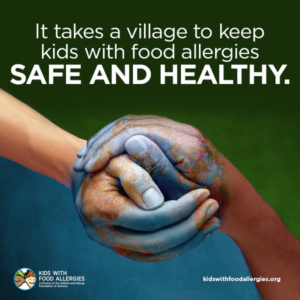When our son was 2 years old, he asked to eat a walnut he saw in our pantry. Less than 20 minutes later, he was in an ambulance being rushed to Cincinnati Children’s Hospital. On that day in 2008, our son became 1 of the 32 million people in the United States that have potentially life-threatening food allergies. This translates to approximately 1 in every 10 adults and 1 in every 13 children (or 2 students per classroom).
Food Allergy Research & Education (FARE) and Kids With Food Allergies (KFA) are two organizations that strive to improve the everyday lives of individuals with food allergies. Here are a few important facts and statistics about food allergies in the United States:
- A food allergy is a medical condition in which exposure to a certain food triggers an allergic reaction.
- Allergic reactions to food can range from mild (itchy mouth, a few hives) to severe (throat tightening, difficulty breathing). In some cases, people can experience anaphylaxis (pronounced an-uh-fil-LAX-is), which is a serious allergic reaction that requires an immediate response and can cause death.
- Epinephrine is the first-line treatment for anaphylaxis and it can reverse severe allergy symptoms.
- A severe food allergy reaction sends someone to an emergency room every 3 minutes. That is roughly 200,000 ER visits per year.
- Between 2007 and 2016, there was a 377% increase in serious allergic reactions to food.
- Nine major food allergens – milk, egg, peanut, tree nuts, wheat, soy, sesame, fish, and shellfish – are responsible for the most serious food allergy reactions.
- There is no cure for food allergies. People with food allergies must avoid the food allergen(s). To stay safe, they must read food labels, ask questions about ingredients, and learn to recognize and treat reaction symptoms.
Chances are, you and your children know someone with food allergies. The Be a PAL: Protect A Life™ From Food Allergies education program teaches children how to be a good friend to kids with food allergies. Talk to your children and highlight these 5 important tips:
- Know that food allergies are very serious.
- Don’t share your food with friends.
- Wash your hands after eating.
- Help all your friends and classmates have fun together.
- If a friend with food allergies gets sick, get help right away.
This week (May 10- 16, 2020) is Food Allergy Awareness Week. As a food allergy parent, I hope you will take this opportunity to learn more about food allergies. Our family is extremely grateful for the friends, teachers, and neighbors who take the time to stay informed and make sure our son is always safe and included. Their actions are founded on a simple value: kindness. To our son, and our family, that kindness means more than they will ever know.


